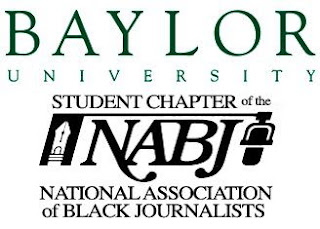Online image repair is one of the biggest issues students face in the 21st Century when careless tweets and irresponsible Facebook posts are common. To help students improve their online presence, the Baylor University National Association of Black Journalists sponsored an image repair panel discussion on Sept. 11.
Panelists critiqued the Facebook pages, tweets and other online content of students and offered effective strategies to help graduates prepare to enter the competitive job market.
KWTX Director of New Media Jay Hicks, who spoke from an employer’s perspective, encouraged students to scrutinize their social media presence through the lens of someone else’s viewpoint.
“If you wouldn’t want your grandparents or parents to see what’s on your page, then you should remove it,” he stated.
One of Hick’s biggest pet peeves is Facebook users who whine and complain about employers, companies and friends in their posts.
“Social media is not the place for this,” he said. “You will be labeled a trouble maker and no one will hire you.”
Hicks estimates that more than 67 percent of hiring managers use social networking sites such as Facebook to find more detailed information about job applicants. This is an increase from a 2009 survey conducted by CareerBuilder.com, which estimated that 45% of more than 2,600 hiring managers reported searching social networking sites to learn about job candidates. In 2008, only 22% reported using them (Students, Here’s How to Kick-Start Your Personal Brand Online).
KeSha Lopez, a KWTX weekend anchor, provided real-world examples from her own job-hunting experiences.
“I was surprised by how many employers had actually Googled my name and looked at my Facebook page,” she said. “You must take your social media presence seriously.”
Dr. Mia Moody-Ramirez, an assistant professor of Journalism, Public Relations and New Media, encouraged students to take a close look at how they present themselves online.
“Start with a goal in mind,” stated Moody-Ramirez, who discussed some of the pitfalls of social media. “Goals include getting a job, driving traffic to your sites and repairing one’s image.”
Strategies for each of these goals range from removing inappropriate content from one’s page to beefing up the number of positive personal posts and photos. The overall objective is to project the image of a person who is well rounded, outgoing, mature and able to make appropriate decisions.
Other tactics include:
1. Ask professors and professionals to critique your pages
2. Remove photos of inappropriate activities such as drinking and using drugs
3. Check your social media pages frequently for content that other people post about you
4. Remove tags to photos that may be considered inappropriate.
5. Remove inappropriate song lyrics and quotes from other people.
6. Include photos and posts of /about yourself in positive activities and settings
7. Did we mention Googling your name to make sure the pages that pop up are positive???
The panel discussion was part one of a three-part series on communicating in a new media environment.
"We believe these workshops will be very useful to students," said NABJ President Jocelyn Fowler. "We wanted to offer something that could make a difference in the lives of students."
NABJ Vice President Jessica Foumena said she is glad she attended the event.
"My schedule is very busy as a graduate student, but this is one event that was worth the time," she said. "I learned a great deal of information that I can apply to my personal online presence."
NABJ will sponsor “Branding” on Oct. 16 and “Creative Resumes” on Nov. 20. For more information, contact President: Jocelyn_Fowler@baylor.edu or adviser: Mia_MoodyHall@baylor.edu









